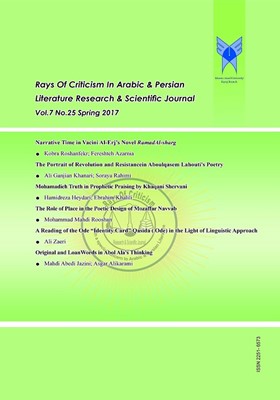-
-
List of Articles
-
Open Access Article
1 - Narrative Time in Vacini Al-Erj’s Novel RamadAl-sharg
Kobra Roshanfekr fereshte azarnia -
Open Access Article
2 - The Portrait of Revolution and Resistancein Aboulqasem Lahouti's Poetry
Ali Ganjian soraya rahimi -
Open Access Article
3 - Mohamadieh Truth in Prophetic Praising by Khaqani Shervani
hamid reza heidari ebrahim khalili -
Open Access Article
4 - The Role of Place in the Poetic Design of Mozaffar Navvab
mohammad mahdi roshan -
Open Access Article
5 - A Reading of the Ode “Identity Card” Qasida ( Ode) in the Light of Linguistic Approach
ali zaeri -
Open Access Article
6 - Original and LoanWords in Abol Ala's Thinking
mehdi abedi jazini asgar ali karami
-
The rights to this website are owned by the Raimag Press Management System.
Copyright © 2021-2025







